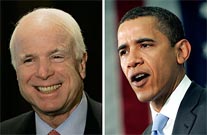Latin America favours Obama, but can handle McCain
 Buenos Aires - Brazilian President Luiz Inacio Lula da Silva said it best for how much of Latin America holds sees the US presidential elections on November 4.
Buenos Aires - Brazilian President Luiz Inacio Lula da Silva said it best for how much of Latin America holds sees the US presidential elections on November 4.
He was upbeat about a victory for centre-left Democrat Barack Obama, the 47-year-old US senator.
"This (financial) crisis, among other benefits it will cause, will get Obama elected as president of the United States. It will get a black man elected, which is no small matter," Lula said bluntly.
Latin America is watching the US election with several aspects in mind: the need for a strong leader in Washington to handle the international financial crisis, the chance to have a more receptive partner in the White House to handle key issues from immigration to the Doha Round of trade talks, and generally the regional preference for the political left.
South America - ruled by governments that can broadly be defined as leftist, from Lula's moderate version to the "21st-Century socialism" of Venezuela's Hugo Chavez - undoubtedly likes Obama better than Senator John McCain, 47, the centre-right Republican.
However, seen from the viewpoint of the Latin American left-wing, neither candidate looks particularly leftist, and many Latin Americans are shocked to hear McCain's campaign calling Obama a socialist.
Retired Cuban leader Fidel Castro blasted McCain as a "liar" and an "instrument of the mafia" as well as "lacking in ethics," saying that Obama was superior to his rival "in intelligence and serenity."
However, he refrained from speaking directly in favour of the Democratic candidate, aware that the US electorate might penalize Obama for any praise.
Chavez dismissed both candidates' criticism of himself as just so much campaign rhetoric, but he spoke for many when he said what Latin America expects from the next resident of the White House.
"The next US president must sit down and talk to the world, that is necessary. Not (talk to) Chavez. Who cares about me?" the controversial Venezuelan said calmly.
When President George W Bush took office, there were high expectations from Latin America, but he conspicuously failed to deliver concrete results.
During his eight years in office, the region's ties to Washington have changed substantially of their own accord.
Latin America has swung to the left. It has sought to distance itself from the Washington-based International Monetary Fund and the World Bank and to diversify its trade away from the United States.
It brought down the US-sponsored proposal for a Free Trade Area of the Americas (FTAA). Brazil in particular has worked hard to build alternative poles of power on a global scale, most notably the group of agricultural producers that is standing up to the United States and Europe in the Doha Round of trade talks.
As the United States prepares to vote, Latin Americans have a wait-and-see attitude and are hoping that whoever gets to the White House next can muster enough talent to reverse the score in the economic crisis.
Mexican tycoon Carlos Slim - the richest man in Latin America and the second-richest in the world, according to Forbes magazine - gave the most graphic explanation of this approach, when he said that the best man to succeed Bush is "the one who can get the US economy to grow fastest."
There remain, however, important areas of Latin America for which the United States is more directly important.
The fate of Mexico and Central America is closely tied to that of their millions of citizens who live and work in the United States: the better they fare, the more funds they send home.
Obama scores points for his greater consideration towards illegal immigrants in the US, and for his general support of the disadvantaged, who include many legal immigrants as well.
McCain, in turn, finds an echo in some areas with his support for free trade.
The Republican would generally be a better option for the current Colombian government. The country remains keen on US assistance, both in the shape of the anti-drug Plan Colombia and in the form of a free-trade agreement that is stalling over Democratic opposition in the US Congress.
Indeed, McCain at least made the effort to travel to Mexico and Colombia - he was in Colombia when government troops freed former Colombian presidential candidate Ingrid Betancourt, after six years as a hostage of leftist rebels.
Latin America ponders the candidates' approaches to Latin America itself, but it knows it stands to gain with a buoyant world economy while it is likely to lose along with everyone else in the world if the slump is here to stay.
It hardly takes an expert in either economics or international politics to realize that the establishment in the United States - as elsewhere - is currently at a loss to stop a snowballing global crisis.
Latin America's leftists would doubtless join everyone else in taking their hats off to whoever can get the giant moving again - even if it is McCain. (dpa)